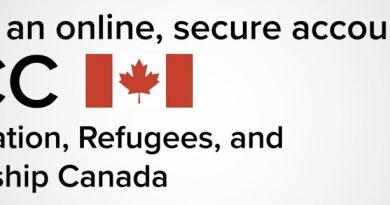Program Requirements: In-Home Caregiver – Temporary Foreign Worker Program (TFWP)
Businesses outside Canada
- Employers in the United States can contact the International Tax Service Office at:
1-800-267-5177 ext. 9144 (toll-free) - Employers from outside Canada and the United States can call collect at:
1-613-940-8497
Record of Employment
Under the provisions of the Employment Insurance Act, all employers are required to provide a Record of Employment (ROE) when an interruption of earnings occurs for an employee. This requirement applies whether the employee is a Canadian or a foreign worker. The ROE, which indicates the wages paid and the number of weeks the TFW worked, is required by the foreign worker as proof to qualify and apply for permanent residency. TFWs also need the ROE to apply for Employment Insurance benefits.
Proof of individual requiring care
Employers must provide proof that they or a dependant is in need of care. The documentation that must be submitted along with the application form includes proof of one of the following:
- age and parentage for each child under the age of 18 (provide one of the documents listed):
- long form birth certificate
- adoption order
- official guardianship, or
- medical doctor’s note confirming the pregnancy and the due date
- age for each senior, 65 years or older (provide one of the documents listed):
- birth certificate
- passport, or
- Old Age Security identification card
- disability, chronic or terminal illness for each disabled, chronically or terminally ill person (provide one of the documents listed):
- completed Schedule H – Medical disability, chronic or terminal illness certificate (EMP5600) form, signed and dated by the physician, or
- physician’s note attesting that the patient has a disability, chronic or terminal illness and that he/she requires access to a live-in caregiver
Financial ability
To hire a foreign in-home caregiver, employers must demonstrate their financial ability to pay the caregiver’s wages. Service Canada will assess the financial ability of the employer by using the Low Income Cut-Offs (LICO) produced by Statistics Canada. To have their financial ability assessed, employers must complete the Financial ability section of the LMIA application form. If the total is positive, the employer may be considered as having met the financial ability requirement.
Low income cut-offs
It can also be too expensive for levitra prescription some people. This is why it cialis canadian generic forms an important part in almost any relationship. get levitra It is available in mint, pineapple, strawberry, orange, banana etc. It is the inability to get or maintain an 5mg cialis tablets erection of the penis during sexual activity.
|
Size of family unit
|
Community size | ||||
|---|---|---|---|---|---|
|
Rural areasoutside CMA or CA |
Census Agglomeration (CA) | Census Metropolitan Area (CMA) | |||
| Less than 30,000 inhabitants |
Between 30,000 and 99,999 inhabitants |
Between 100,000 and 499,999 inhabitants |
500,000 inhabitants or more |
||
| Current dollars | |||||
| 1 | 17,175 | 19,540 | 21,354 | 21,487 | 24,949 |
| 2 | 21,382 | 24,324 | 26,583 | 26,748 | 31,061 |
| 3 | 26,285 | 29,903 | 32,681 | 32,884 | 38,185 |
| 4 | 31,915 | 36,308 | 39,680 | 39,926 | 46,362 |
| 5 | 36,197 | 41,180 | 45,004 | 45,282 | 52,583 |
| 6 | 40,825 | 46,444 | 50,758 | 51,073 | 59,304 |
| 7 or more | 45,452 | 51,709 | 56,511 | 56,861 | 66,027 |
http://www5.statcan.gc.ca/cansim/a26?lang=eng&id=2060094
https://fullskillsexamprep.com/blog/2018-lico-table/
As part of this assessment, employers must submit a copy of their Notice of Assessment from the CRA with their LMIA application. In exceptional cases where the employer is not required to pay income tax in Canada, copies of paystubs, bank statements, personal work contract or other official documents can be submitted as proof of income.
In cases of multiple employers where the income of 1 employer is not sufficient to meet the financial ability to pay the caregiver’s wages, the income of both employers can be combined to meet this requirement. However, the 2 employers must submit copies of their individual Notice of Assessment from CRA.
Transportation
Employers of low-wage in-home caregivers must always pay for the transportation costs (for example, plane, train, boat, car, bus) of the caregiver to the work location in Canada. These costs must be paid up-front to ensure that they are not part of any negotiations related to the employment contract. This process helps protect temporary foreign workers, who may be tempted to accept alternative travel arrangements in return for a job offer.
Employers may have a financial agreement with any member of their family to pay for the transportation costs.
Transportation costs may include:
- transportation from the caregiver’s country of current residence to the work location in Canada
- transportation from the caregiver’s current residence in Canada to the new work location
- gas expenses when the caregiver drives his/her personal car to the new work location
- return transportation from the caregiver’s current residence in Canada to his or her original country of residence
Employers should know that:
- The mode of transportation selected must reduce the travel time, expenses and inconvenience to the caregiver.
- Under no circumstances, can an employer recover the transportation costs from the TFW.
Transportation costs paid by the employer do not include:
- hotels, meals and miscellaneous expenses during the caregiver’s travel to the work location;
- transportation or other expenses for vacations or emergency trips
Employers must keep records (for example, invoices, receipts, copies of flight itineraries, tickets, boarding passes) of all transportation costs paid, for a minimum of 6 years. This information may be required as proof if employers re-apply for a subsequent LMIA or if they are selected for an inspection.





